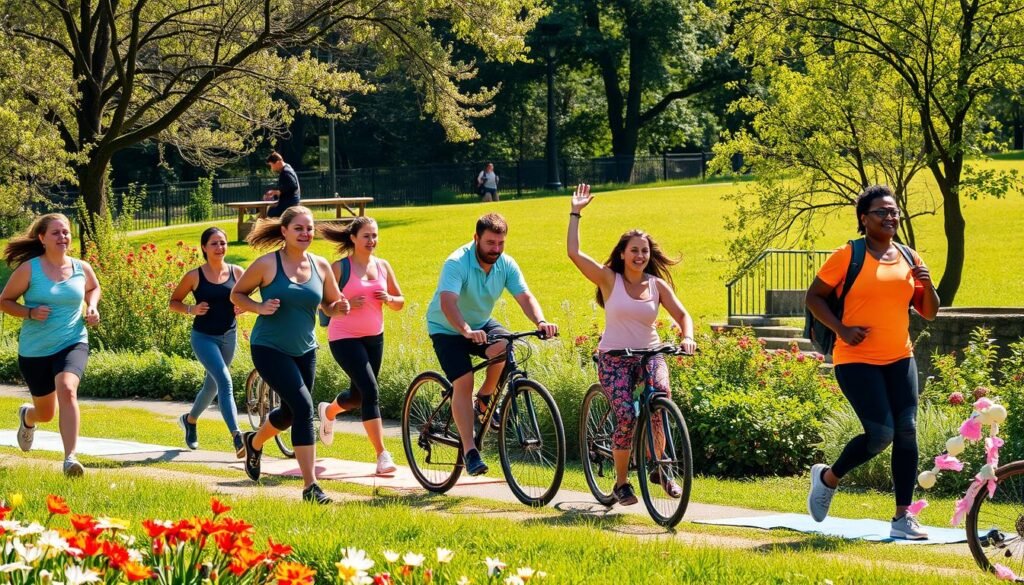Did you know a quick 15-minute walk can boost your energy? Being active for 2 hours and 30 minutes a week is recommended for adults. This shows how natural methods can increase energy and beat tiredness. This article will guide readers on improving energy and stamina using diet, workouts, and lifestyle changes.
Key Takeaways
- Incorporating regular meals and healthy snacks every 3 to 4 hours is essential for maintaining energy levels.
- Consistent sleep patterns, avoiding naps, and engaging in relaxing activities before bedtime can lead to better energy restoration.
- Foods rich in whole grains and high fiber are ‘slow-release’ and assist in maintaining stable energy levels throughout the day.
- Engaging in 10 minutes of physical activity can provide an immediate lift in energy.
- Adequate hydration plays a key role in sustaining energy; even mild dehydration can lead to feelings of tiredness.
- Surrounding oneself with positive individuals can enhance mood and energy levels, making social connections vital for vitality.
- Prioritizing morning meals allows for sustained energy throughout the day.
Understanding Energy Levels
Energy levels are vital for our health and day-to-day activities. They depend on both what’s inside us and the world around us. For instance, how our body turns food into energy and whether we have any illnesses can affect them.
Outside things like stress and what we eat matter too. Stress can make us feel tired and worn out. To keep up our energy, it’s important to handle stress well. Eating the right foods full of nutrients also keeps our energy up. If we skip meals or don’t eat well, our energy can drop.
Being hydrated is key as well. Not drinking enough water leads to more fatigue and weaker muscles. Water is good for our brain and mood, helping us feel more energetic. Exercise also helps by fighting off tiredness and making our sleep and energy better. Staying active keeps us feeling strong and lively.
To bump up our energy, it’s helpful to look at the big picture. This means caring for both our minds and bodies. By doing this, we can find the best ways to lift our energy and make every day better.
| Factors Affecting Energy Levels | Impact |
|---|---|
| Sleep | Aiming for 7-8 hours is essential for boosting energy and vitality. |
| Stress | High stress levels can decrease energy and worsen fatigue. |
| Exercise | Regular activity enhances endurance and reduces feelings of tiredness. |
| Diet | A balanced diet is crucial for maintaining consistent energy levels. |
| Hydration | Staying hydrated helps improve mood and energy, critical for daily functions. |
Signs of Low Energy and Fatigue
It’s important to know the signs of low energy for your health. Common signs are feeling tired all the time, not wanting to do things, and finding it hard to focus. Many things can cause these feelings, from how you live to medical issues.
Sleep problems like not sleeping well or sleep apnea can make you feel sleepy during the day. Changes in hormones, like low testosterone in men or changes in estrogen for women, matter too. Mental health issues such as depression or anxiety can also make you feel very tired. Chronic fatigue syndrome means you’re always exhausted, even after resting.
Some health issues can also make you feel tired. Anemia can make you weak because you don’t have enough red blood cells. Heart disease can make it hard for your heart to pump blood right, making you tired. And if your thyroid isn’t working well, you might feel tired, gain weight, and feel weak.
Certain medicines can lead to feeling tired. Medications for blood pressure and mood can have tiredness as a side effect. Not eating right and not drinking enough water can also make you feel tired. If you don’t get the vitamins you need, or if you’re dehydrated, it can lower your energy.
Understanding these signs can help you make changes for the better. Knowing about your body and energy levels is key. This way, you can make smart choices to feel more alive.
How to Increase Energy Levels with Nutrition
Nutrition is key to boosting energy and fighting fatigue. Eating right makes a big difference in how you feel all day. Starting your day with a good breakfast and eating foods that release energy slowly helps. This can keep you going strong.
Importance of Breakfast for Sustained Energy
Breakfast is the start of an energetic day. Studies show eating breakfast means less tiredness than skipping it. Foods like oatmeal release energy slowly, which is great in the morning.
Adding protein and healthy fats makes breakfast even better. It keeps you full and keeps your energy up until lunch.
Choosing Slow-Release Foods for Long-Lasting Energy
Eating foods that release energy slowly is key to feeling good all day. Whole grains, fruits, and veggies are perfect for this. Bananas, for example, give energy just like sports drinks do for athletes.
- Chia seeds: Two tablespoons have almost 12 grams of carbs and good omega-3 fats.
- Beans: They’re packed with protein, fiber, and magnesium, which are great for energy.
- Dark chocolate: It has antioxidants and less sugar, so it’s good for your mood and energy.
Choosing these foods and drinking enough water is important, especially when you exercise. Eating regularly, every 3 to 4 hours, helps beat tiredness, say experts. Vitamins like B12, magnesium, and zinc are also good for fighting fatigue.
| Food | Main Benefit | Nutritional Contribution |
|---|---|---|
| Oatmeal | Slow Energy Release | Complex carbohydrates |
| Bananas | Quick Energy Boost | Carbohydrates and potassium |
| Chia Seeds | Omega-3 Source | Fiber and healthy fats |
| Beans | Sustained Energy | Protein, fiber, and magnesium |
| Dark Chocolate | Mood Enhancement | Antioxidants and minimal sugar |
Regular Exercise as a Natural Energy Booster
Working out regularly is a great way to naturally boost your energy. It brings many benefits that improve well-being. Exercise makes you stronger and helps your heart work better. This means your body gets oxygen and nutrients more effectively, making you feel more energized. Also, it can keep health problems like high blood pressure and type 2 diabetes at bay.
Simple Exercises to Kickstart Your Day
Starting your day with some easy exercises can really wake you up. You can try:
- Brisk walking or jogging for at least 30 minutes
- Stretching exercises to improve flexibility
- Bodyweight workouts such as squats, push-ups, and lunges
- Cycling or swimming for a refreshing change
These activities boost your metabolism and make you happier by activating brain chemicals. They set a positive start to your day, helping you focus better. For more ideas, here’s a helpful guide for nurses.
The Role of Physical Activity in Boosting Metabolism
Exercise is key in speeding up your metabolism. Following the U.S. Department of Health and Human Services’ advice, 150 minutes of aerobic activity each week can boost your metabolic rate. Mixing moderate and vigorous exercises, like brisk walking and running, has even better results. Doing strength training twice a week for all major muscle groups also raises your metabolism and energy.

Regular exercise helps you manage your weight and sleep better. It makes it easier to fall asleep and improves your sleep cycle. With consistent exercise, you’ll enjoy more energy, better mental health, and stronger stamina for work and personal life.
Hydration: The Key to Staying Energized
Staying well-hydrated is key to keeping your energy up and overall health in check. Our bodies are around 60% water. This makes it crucial to drink enough water for best performance every day. Knowing when you’re getting dehydrated helps keep your energy levels steady.
Signs of Dehydration and Its Effects on Energy
Dehydration signs can show up in many ways and impact how well you think and move. You might feel:
- Fatigue
- Lack of focus
- Dizziness
- Dry mouth and skin
- Headaches
Even a small drop in your body’s water level—1–3% of your weight—can hurt your brain function and zap your energy. That’s why keeping an eye on your water intake is key to staying alert and energetic.
How Much Water Should You Drink Daily?
It’s suggested to drink around eight 8-ounce glasses of water a day, or about 2 liters. If you’re active or in a hot place, you might need more. Athletes can sweat out 6–10% of their body water during hard workouts. Drinking plenty of water boosts not just energy, but also overall well-being. It can even help prevent headaches and constipation. If you want to up your hydration game, consider exploring different ways to hydrate.
Yoga and Mindfulness for Improved Stamina
Making yoga and mindfulness a daily habit can boost stamina. Studies show they lower stress and make your mind clearer. These are key for keeping energy up.

A 2016 study with 27 medical students found big benefits from 6 weeks of yoga and meditation. They felt less stressed and more energetic. They also got tired less often. Regularly doing yoga can really help beat tiredness.
A 2017 research looked at tiredness from work. Physical activities, including yoga, improved energy and brain function. Hatha yoga is especially good for raising energy levels. It works better than just mindfulness.
Mindfulness meditation is also vital for increasing energy. It makes you more aware of your thoughts and feelings. You learn what your body and mind need. This helps you make choices that boost your energy.
Yoga and mindfulness together tackle tiredness and build stamina. They help you find the right balance in life. This strengthens both your body and mind.
Leveraging Aromatherapy to Fight Tiredness
Aromatherapy is a natural way to combat tiredness and increase your energy. Essential oils like Lemon, Peppermint, and Grapefruit are great for boosting mood and alertness. These oils’ invigorating properties help get rid of fatigue and perk up your spirit.
Lemon essential oil has limonene, which makes it cleansing and energizing. Peppermint oil, with its menthol, boosts brain function. It’s great for an afternoon energy lift.
Grapefruit oil cheers you up and lowers stress and anxiety due to its limonene. Rosemary and eucalyptus oils have 1,8-Cineole. They clear your head and improve focus, perfect for tough tasks.
Using aromatherapy means spreading these oils’ scents around your space. This fights off tiredness and makes your environment nicer. For a fast effect, mix the oils with a carrier oil, like jojoba, and apply to your skin.
Cinnamon oil is also beneficial with its warm and stimulating effects. It can speed up metabolism and stabilize blood sugar. Adding aromatherapy to your daily life boosts your energy and mood, leading to a more dynamic living.
Social Connections and Their Impact on Vitality
Social connections are key to boosting vitality. Studies show that people with many social ties have more energy and better moods. For example, research among nursing home residents found those with more social contacts felt livelier.
Spending time with positive, supportive people can cut stress and lift your spirits.
Being around uplifting people can ease anxiety and strengthen your immune system. Negative energy, on the other hand, can up stress and lower vitality. Building and keeping strong social bonds takes effort. Setting limits and making time for fun interactions can change your life and energize you.
Joining clubs or going out with friends and family can enhance your social life. Plus, good talks and shared fun can spread vitality in your circle.
- Spend time with supportive individuals: Being with positive folks reduces stress and improves well-being.
- Take breaks with loved ones: Quick trips or hangouts can boost your physical and emotional energy.
- Engage in mindfulness practices: Meditation can refocus your energy and make socializing better.
- Participate in community events: This builds connections and emotional support.

Keeping these connections helps not just you but your community too. When everyone tries to add vitality to their social circles, it creates a network of supportive relationships. This lifts everyone.
| Factor | Impact on Vitality |
|---|---|
| Positive social interactions | Increases energy levels and lowers stress |
| Chronic negative energy | Leads to heightened anxiety and decreased vitality |
| Engagement in supportive activities | Enhances well-being and boosts mental health |
| Mindfulness practices | Improves personal energy and interaction outcomes |
Promoting a Healthy Sleep Routine for Optimal Energy
A good sleep routine is key to staying energetic all day. It’s important to form habits that lead to good sleep. This helps improve your mood, energy, and how well you think. Making your sleeping area better and practicing good habits leads to deep sleep. This way, you wake up feeling fresh and ready for the day.
Tips for Better Sleep Quality
Here are some smart tips for a better sleep routine:
- Aim for 7-8 hours of sleep per night to keep energy high.
- Maintain a consistent sleep schedule by sleeping and waking up at the same hours daily.
- Keep the bedroom temperature between 60-67°F (15.6-19.4°C) for a comfy sleep.
- Limit exposure to blue light from screens an hour before bed to boost sleep hormone levels.
- Avoid caffeine in the afternoon as it can mess with your sleep.
- If napping, keep it brief, about 20 minutes, so it doesn’t ruin night sleep.
- Choose a mattress that helps reduce pressure for better rest.
- Limit alcohol and nicotine before bed, as they can worsen sleep.
- Practice relaxation techniques like meditation or writing in a journal to calm down before bed.
- Get natural light during the day to maintain your internal sleep clock.
- Have a calming bedtime routine with activities like baths, stretching, or reading.
By following these steps, you can create a sleep routine that boosts your energy and health.
Conclusion
To boost energy and vitality, a complete approach is needed. This includes good nutrition, exercise, drinking enough water, mindfulness, and good sleep. Eat foods rich in iron and healthy fats to beat tiredness. Also, remember that some chronic illnesses make people feel constantly tired. It’s key to have a plan that fits your health needs.
Exercising is a top way to increase energy naturally. It boosts your metabolism and stamina. Drinking enough water is also essential. Even being a little dehydrated can make you feel tired. Yoga and similar mindfulness exercises help your mind and body stay strong and balanced.
Don’t forget how critical good sleep is. Adults need 7 to 9 hours every night to fully recharge. By adding these habits to your day, you can enjoy more energy. This leads to a healthier, more active life.